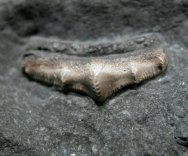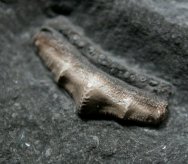Campodus
sp.
Class Chondrichthyes,
Subclass Elasmobranchii, Order Eugeneodontida
Geological
Time: Upper Pennsylvanian, Missourian Stage, (~300 million years ago)
Size (25.4
mm = 1 inch): Shark Tooth 12 mm; Matrix: 46 mm by 29 mm
Fossil Site:
Stark Shale, Kansas City, Missouri
Fossil Code:
VE032
Price: $110.00
- sold
 The
late Pennsylvanian and early Permian dark shale deposits of the
Midwest have produced some exceptional examples of fossils of the
elasmobranches, the grouping to which sharks and rays belong. These
horizons are the result of deep water deposits during marine transgressions
into the interior of the continent that are known as cyclothems.
These black shales represent deposition in a low to no oxygen environment
which allowed for exceptional preservation of specimens that were
free from predation and scavenging. This is a fine example of a
tooth from a Eugeneodontid shark known as Campodus. These sharks
may have been plankton feeders. The teeth do not have the sharp
edges suited for tearing flesh, and the tiny ridges across the crown
of the tooth do not suggest they were suited for crushing shells
of invertebrates. Some teeth have been found that were 100 mm across,
indicating a giant some 12 meters in length. The
late Pennsylvanian and early Permian dark shale deposits of the
Midwest have produced some exceptional examples of fossils of the
elasmobranches, the grouping to which sharks and rays belong. These
horizons are the result of deep water deposits during marine transgressions
into the interior of the continent that are known as cyclothems.
These black shales represent deposition in a low to no oxygen environment
which allowed for exceptional preservation of specimens that were
free from predation and scavenging. This is a fine example of a
tooth from a Eugeneodontid shark known as Campodus. These sharks
may have been plankton feeders. The teeth do not have the sharp
edges suited for tearing flesh, and the tiny ridges across the crown
of the tooth do not suggest they were suited for crushing shells
of invertebrates. Some teeth have been found that were 100 mm across,
indicating a giant some 12 meters in length.
|
|


